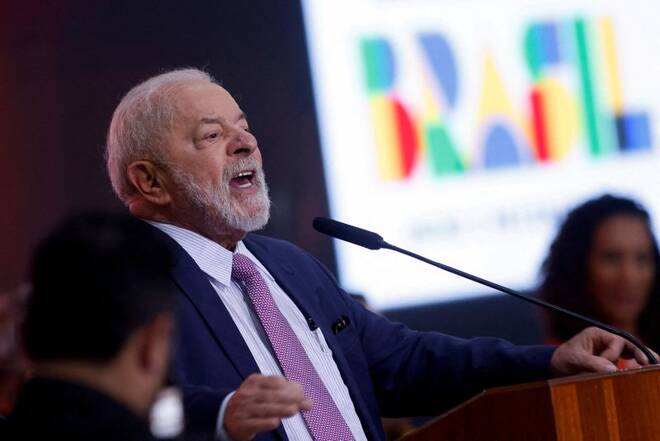Advertisement
Advertisement
Brazil meat industry lobby laments Lula’s absence from China trip -sources
By:
By Nayara Figueiredo SAO PAULO (Reuters) - Brazilian President Luiz Inacio Lula da Silva's inability to accompany a government mission to China frustrated meat industry lobbyists who had hoped his presence this week would help persuade Beijing to issue more export licenses for Brazilian companies, according to two sources, who spoke on condition of anonymity.
By Nayara Figueiredo
SAO PAULO (Reuters) – Brazilian President Luiz Inacio Lula da Silva’s inability to accompany a government mission to China frustrated meat industry lobbyists who had hoped his presence this week would help persuade Beijing to issue more export licenses for Brazilian companies, according to two sources, who spoke on condition of anonymity.
Lula canceled his planned visit to China after being diagnosed with pneumonia. The Brazilian government is trying to reschedule it for April 11.
Other senior ministers and executives went ahead with the trip. But Agriculture Minister Carlos Favaro told meat industry executives during the visit that any new agreements would hinge on Lula’s presence, one of the sources said.
The government did not reply to a request for comment.
Favaro said more than 50 Brazilian meat plants had applied for export permits with the Chinese government.
In the end, four permits were awarded and two further meatpackers had bans lifted, including a chicken plant run by BRF SA, which is still seeking to restore export permits for its two largest units in Brazil, according to previous Reuters reports.
Eight meatpackers had been considered ready by the industry to be cleared by Beijing to sell meat, said the sources.
The sources said that in addition to securing more export permits and restoring suspended ones, the industry was also keen on reopening talks on health protocols around atypical cases of bovine spongiform encephalopathy, or mad cow disease.
Under an existing protocol, Brazil must impose a nationwide beef export embargo when a case is detected, while submitting information to China. However, the Brazilians want bans to be regional to preserve beef trade flows.
“The discussion about the sanitary protocol of the self-embargo in cases of mad cow in Brazil would also be something to be done with Lula, and was left for later,” one of the sources said.
“Nothing prevents new export licenses from being issued as a result of the mission to China,” said another source. “But now we cannot say when this will happen.”
(Reporting by Nayara Figueiredo; Writing by Ana Mano; Editing by Rosalba O’Brien)
Related Articles
About the Author
Reuterscontributor
Reuters, the news and media division of Thomson Reuters, is the world’s largest international multimedia news provider reaching more than one billion people every day. Reuters provides trusted business, financial, national, and international news to professionals via Thomson Reuters desktops, the world's media organizations, and directly to consumers at Reuters.com and via Reuters TV. Learn more about Thomson Reuters products:
Latest news and analysis
Advertisement
